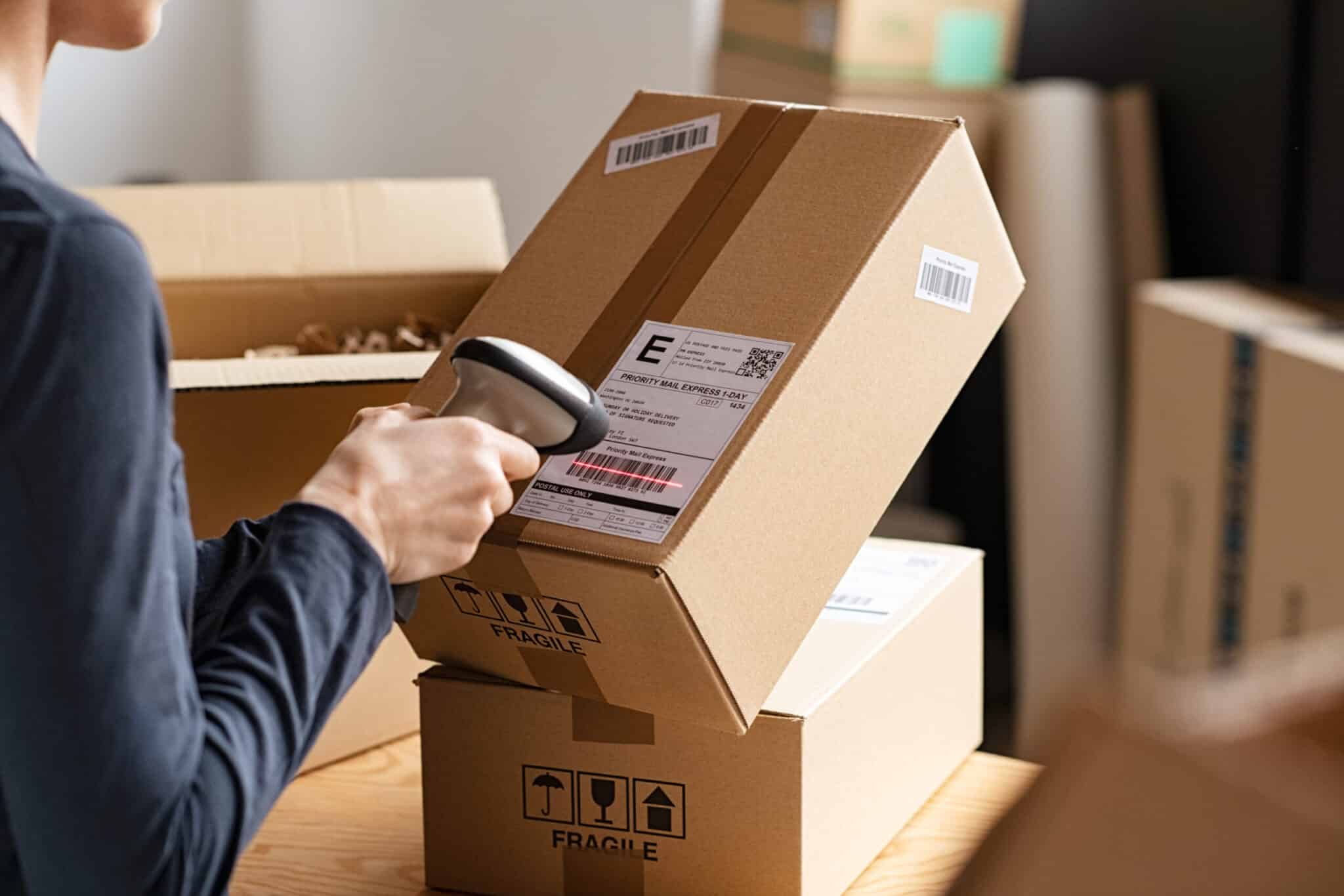With the rise of e-commerce, small businesses now face an unprecedented variety of shipping and delivery options that were unavailable a few years ago. This opened up possibilities for smaller businesses to compete globally and brought new challenges.
Throughout my career, I have worked with many clients, from small startups to large corporations, helping them improve product delivery times and optimize shipping costs. I’ve dealt with different logistical requirements, including trucking, rail shipping, air freight, and international logistics.
Optimizing how shipped items can save money on postage and materials or reduce delays and errors that could lead to costly returns of undelivered merchandise. However, to ensure effective shipping for your small business, it is essential to consider every factor that goes into the shipping process.
In this article, I’ll provide you with some of the tips that I have found to be invaluable in my work. From understanding the different shipping options to finding the right shipping services provider, these tips will help make your shipments as smooth and cost-efficient as possible.
Common Shipping Costs
Shipping costs for online retail can vary significantly depending on the size and weight of the shipped item and the shipping distance. For many small businesses, shipping can become a significant expense as postal services and carriers may charge different rates for their services.
These costs can comprise a large portion of the overall expenses of shipping a single item. However, many other factors must be considered when calculating the shipping cost.
Some of these factors include the following:
- Supplies
- Import & Export Fees
- Service & Speed
- Dimension & Weight
- Distance
Supplies
The right supplies are essential to successful shipping operations, especially for small businesses. It’s important to have strong packaging materials, such as heavy-duty corrugated cardboard boxes and durable bubble wrap.
You should also invest in quality packing tape, labeling supplies, and packing slips that will help you keep your packages secure and organized. Additionally, consider investing in an automated scale to weigh packages accurately for accurate cost calculations.
Purchasing supplies from reliable vendors can also help you receive the best quality at competitive prices. The right supplies can save time and money, helping small businesses succeed in shipping operations.
Import & Export Fees
Import and export fees are also a vital part of the shipping process for small businesses. When shipping internationally, it is vital to research and understands each country’s import and export duties to avoid unexpected costs.
Import taxes refer to the taxes placed on goods imported into a particular country, while export taxes may be assessed on goods shipped out of the country. These taxes are usually calculated as a percentage of goods imported or exported and vary from country to country.
Additionally, some countries offer preferential trade agreements that can significantly reduce import and export duty costs for certain goods. Businesses need to familiarize themselves with these agreements to take full advantage of their benefits when international shipping.
Service & Speed
When it comes to shipping for small businesses, service and speed are other essential components of a successful strategy. This is why finding the right balance between providing excellent customer service and ensuring orders arrive quickly and on time is crucial.
Investing in the right delivery partner can help you accomplish both goals. Working with a provider that offers fast, reliable shipping services with tracking capabilities ensures customers know exactly when their order will arrive and can track its progress if necessary.
Additionally, having an experienced customer service team available to help solve any issues is critical to keep customers satisfied with their purchase experience.
Dimension & Weight
It is also important to consider dimension and weight in shipping costs, as some carriers charge more for packages that exceed certain size and weight restrictions. Knowing the size of your package can help save money on shipping for small businesses.

However, choosing the right size box can also ensure the item is safely shipped without costing businesses too much. Although depending on the type of items shipped, it may be beneficial to use a variety of different-sized boxes, bubble mailers, and envelopes.
Additionally, consider using lightweight materials like foam or packing peanuts when packing items in larger boxes. Understanding the size and weight restrictions for both parcel and freight shipments will help ensure the efficient transportation of items.
Distance
Businesses should also take into account distance when shipping products out to customers. It is essential to consider how long a package might take to get from point A to point B, as this will directly affect delivery times and customer satisfaction with the product.
A business sending items across the country or internationally can expect longer transit times than it does to ship locally. Likewise, packages sent to rural areas may also experience longer transit times due to limited transportation options in those areas.
Businesses must also be aware of any distance limitations within their carrier’s network before a shipment. That is why distance is an important factor in shipping, as different distances carry different costs and require different levels of preparation depending on the carrier and destination.
Top Shipping Tips for Small Businesses
Small businesses have an exciting opportunity to use shipping to their advantage. It can help business owners improve their customer experience, differentiate their brand, and ultimately grow their business.
To get started, here are a few of our top shipping tips for small businesses:
Tip 1: Have a Solid Return Policy
A return policy is essential to running a successful small business. Customers need to have confidence that their purchases are backed by a clear, fair, and reasonable return policy. This policy can help build loyalty and customer satisfaction with your products.
The critical components of a good return policy include the following:
- Specifying what conditions qualify for returns
- Determining the length of time customers have to make returns
- Deciding who pays for costs associated with the exchange or refund
- Calculating the restocking fees associated with the return
The best way to ensure customers understand your return policy is to include it on product pages, in email confirmations, and in invoices or packing slips for every shipment. Clear policies can also save small businesses hours resolving customer disputes over unmet expectations.
Tip 2: Keep Track of Carrier Pricing
It’s vital for small business owners to keep track of carrier pricing for their shipments. To do this, you should check the prices frequently and ensure you use the most economical option.
You should also use tools like shipping calculators or freight management services to compare different carriers and better understand how costs vary over time. It can also be helpful to negotiate rates with carriers for better deals on larger orders or items that need special care during transit.
By taking advantage of these tools, small businesses can save money on shipping and ensure they offer their customers the best possible deals. With this knowledge, entrepreneurs can make informed decisions about which carriers offer the best value for their business needs.
Tip 3: Don’t Overlook Shipping Supplies
Small businesses should not overlook the importance of having the proper supplies. Using too large a box can cost more in terms of additional shipping costs, whereas using too small a box can cause damage to the item being shipped.

When selecting supplies, consider factors such as the weight and size of your shipment, and choose boxes and envelopes accordingly. It is also essential to use an impact sensor on parcels and have appropriate cushioning materials to protect fragile items and ensure they reach their destination safely.
Additionally, use labels, stamps, and other marking materials to ensure the package is addressed with the correct information clearly. Taking the time to properly package shipments will help prevent returns due to damages and also create a positive experience for customers.
Tip 4: Try Outsourcing Fulfillment
Outsourcing fulfillment can be an excellent option for small businesses to reduce shipping costs and time. Working with a third-party logistics provider instead of managing in-house inventory and shipping can save costs, speed up delivery times, and improve customer service.
By outsourcing the process of packing orders, preparing labels, booking transport, and tracking shipments, businesses can take advantage of the expertise of professionals while conserving resources.
Additionally, using an outsourced fulfillment partner can provide access to extra capacity during peak periods, helping businesses better manage seasonal spikes or spikes in demand due to promotions.
Tip 5: Offer Free Shipping
Free shipping can be a great incentive for customers to choose your business. It saves customers money, encouraging them to make more purchases or even become repeat customers.
Offering free shipping also allows businesses to increase their average order value and gain a competitive edge over other businesses in the market. When done correctly, offering free shipping can significantly impact profits, increasing customer loyalty and higher retention rates.
Additionally, offering free shipping may help reduce returns and cancellations since customers don’t have to worry about extra fees after purchasing an item. Offering free shipping can be beneficial for small business owners. However, businesses must consider their margins and budget when offering such a service.
Tip 6: Automate Your Shipping Process
Automating your shipping process is another excellent way for small businesses to reduce time and cost while maintaining efficiency. This can be done through software or digital tools that help streamline the order fulfillment process, from order placement to package tracking.
By using automated processes, businesses can quickly:
- Create shipping labels.
- Reduce shipping costs.
- Ship via multiple carriers.
- Calculate taxes and duties automatically.
- Receive real-time updates on package delivery statuses.
Automation also helps small businesses manage their inventory better by providing accurate real-time stock information and orders. Some software solutions even have built-in features, so businesses don’t have to manually check each package when they arrive back at their warehouse.
By automating your shipping process, you can save time, money, and resources while ensuring your products are delivered quickly and accurately to customers.
Tip 7: Get a Thermal Label Printer
Getting a thermal label printer is one of the most important tools for small businesses that ship products. Thermal label printers are fast and reliable, producing high-quality labels that stand out.
Thermal printing technology uses heat to transfer an image onto paper or other surfaces, so labels produced with this printer are sharp and vibrant. These printers are also highly durable, require minimal maintenance, and can last several years before needing replacements.

Additionally, they often have built-in software to help you quickly create custom labels with your company’s branding and logo. With a thermal label printer, businesses can increase their shipping operations efficiency while ensuring that their packages look professional and well-presented.
Tip 8: Get Shipping Software
Getting shipping software is invaluable for small businesses hoping to improve their shipping process. The best shipping software can provide insights into cost savings and a streamlined workflow to ensure that shipments are properly managed from start to finish.
This software includes features like:
- Automated address verification
- Dynamic rate calculations
- Package tracking
With the ability to compare rates from multiple carriers in real time, small businesses can save time and money by avoiding unnecessary fees. That is why investing in a quality shipping solution is an excellent way for small businesses to streamline operations and maximize profits.
Tip 9: Print Postage in-House
Printing postage in-house can be incredibly convenient for small businesses to save time and money on shipping. With the right tools, businesses can print out postage on the premises, saving them the hassle of going to a post office or mailroom.
Additionally, printing your own postage can provide detailed tracking information so you know where a package is at all times. Postage printers can also print labels with a barcode, allowing carriers to quickly scan parcels when they arrive at sorting centers or delivery depots.
This process makes it easier for customers to track packages more accurately and efficiently. That is why it is an ideal solution for small businesses looking to simplify their shipping processes while ensuring accurate delivery of their products and packages.
Tip 10: Leverage Shipping for Customer Interactions
Small businesses can leverage shipping to create new customer interactions that drive loyalty and build relationships. For example, a small business could include handwritten thank you notes in each package they ship out, giving the purchase a more personal touch.
Or give customers the option to upgrade their shipping to express delivery for an additional cost to be sure their order gets to them quickly and efficiently. Dropshipping is also a great way to automate customer interactions and create a smoother ordering experience.
Additionally, small businesses can use shipping policies to upsell products or add freebies as incentives for customers who spend over a certain amount. With creative thought and planning, small businesses can use this powerful tool to get products into customers’ hands, provide an exceptional experience, and build long-term relationships.
Best Small Business Shipping Carriers
When it comes to small business shipping, there are many different carriers to choose from. The best carrier for your small business will depend on the size, the type of items you need to ship, and how quickly they need to be delivered.
Popular carriers for small businesses include the following:
- DHL International Shipping
- FedEx Fast Service
- USPS Small Business Shipping
DHL International Shipping
DHL International Shipping is a top-rated carrier for small businesses. Offering lower rates and faster delivery times than other carriers, DHL provides an efficient solution for global shipping needs.
Their international network spans over 220 countries and territories, so businesses can get their products shipped almost anywhere in the world quickly and securely. Additionally, they provide specialized tracking and tracing services to help customers keep tabs on their shipments from beginning to end.
Their commitment to quality customer service is second-to-none, with 24/7 support for shipment questions or concerns. Whether you need your goods delivered across the street or the ocean, DHL International Shipping is a reliable partner for your small business’s shipping requirements.
FedEx Fast Service
FedEx Fast Service is an ideal shipping carrier for small businesses that need to meet tight deadlines. Its delivery guarantees are unmatched, with additional options, such as Same-Day Delivery and Rush Delivery, available for time-sensitive packages.
This service also offers a range of cost-effective shipping solutions, from ground freight to air freight, making it easier for businesses to manage their budgets when shipping.
Additionally, FedEx’s network makes it possible for shippers to send packages virtually anywhere in the world quickly and efficiently. With its focus on reliability and speed, FedEx Fast Service is an excellent choice for small businesses looking for a reliable way to ship their products.
USPS Small Business Shipping
USPS is one of the most popular small business shipping carriers and offers many services tailored to businesses. It offers parcel delivery, freight solutions, media mail, and international services.
The company has various options to help businesses ship products quickly and efficiently. However, they also offer discounted shipping rates for businesses that send out high volumes of mail or packages.
Additionally, USPS provides specialized services, like Priority Mail Express International, which expedites international shipping at an affordable rate.
With USPS Small Business Shipping, businesses can easily track their shipments in real time, giving them peace of mind that packages are delivered on time and with the highest possible level of security.
Conclusion
Shipping is an essential part of running a successful small business. It can be a simple and stress-free process for customers and business owners if done correctly.
By properly managing your shipping operations, you can reduce costs while providing high-quality customer service. Regardless of the size of your business, it is crucial to have a comprehensive understanding of the best practices for efficient shipping.
Are you a small business owner? Do you have any questions about shipping tips for small businesses? Let us know in the comments below!
Frequently Asked Questions
The best way for a small business to ship items is to use reliable carriers. Popular carriers such as DHL International Shipping, FedEx Fast Service, and USPS Small Business Shipping all offer efficient solutions for getting goods shipped to their destination quickly and securely.
Businesses should take advantage of discounted rates carriers offer for high volumes of packages or mail to make shipping more efficient. They should also consider using tracking and tracing services to better monitor their shipments from start to finish.
Small businesses can handle shipping by using reliable carriers that offer cost-effective solutions for their requirements. Additionally, they must keep accurate records and track shipments to ensure their goods arrive on time and in good condition.
Yes, small business owners can save money on shipping by taking advantage of discounted rates and specialized services carriers offer. Additionally, they can also choose the least expensive shipping method for their needs to minimize costs.
Yes, some tips for making international shipping easier include taking advantage of priority mail express and bulk shipping options and researching customs requirements and regulations beforehand.
The cheapest shipping method for small businesses is USPS First-Class Mail, which offers a cost-effective way to send items weighing up to 13 ounces with delivery times ranging from 2 to 3 days. For heavier packages, it is best to use discounted rates offered by carriers such as FedEx and DHL.
Business owners can get cheap shipping by researching discounted rates from carriers and taking advantage of bulk shipping options. They may also be able to negotiate better prices with their chosen carrier, depending on their package volume.
The post Shipping Tips for Small Businesses (2023) appeared first on Tweak Your Biz.
No comments:
Post a Comment